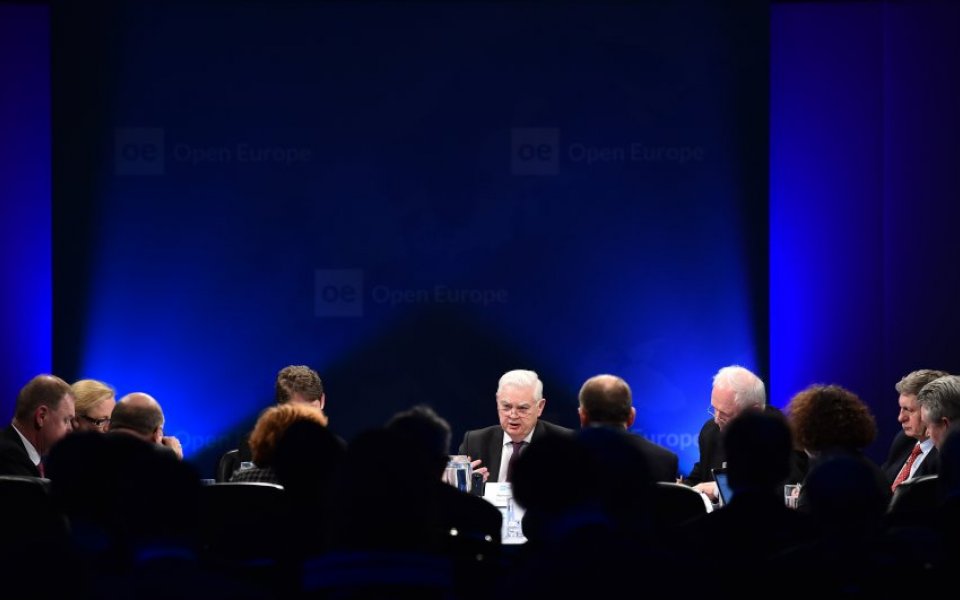The EU’s mask has slipped: The dogma of political union is all that matters

I have been fascinated by strategic simulations, or war games, since I was called upon to play them for various American diplomatic and intelligence services during my years in Washington. Games – if they are well enough designed to approximate reality and have good enough players – almost always get at hidden truths, and tend to grasp the essential. Of all the many forms of consulting my firm is involved in, I must confess that designing and playing war games for corporate clients is my favourite task.
True to form, last week’s Open Europe War Game, which I was delighted to moderate, revealed a great deal about the European elite. After eight exhausting hours of play under the television lights, masks had come off, as we were faced with the fascinating spectacle of weary European politicians telling the absolute truth, shorn of diplomatic niceties, regarding their genuine attitudes. These feelings, different from the questions that now dominate the British media’s coverage, will do much to determine the current negotiations between David Cameron’s government and Brussels, and all that follows.
The morning session, with the able Sir Malcolm Rifkind representing the UK, was professional, workmanlike, and reasonably good humoured. In it, the conceit was that Britain was in the process of negotiating a deal, ahead of the Brexit vote. Even given these good vibrations, the nine European players (representing Sweden, the Netherlands, Germany, France, the EU institutions, Poland, Spain, Italy, and Ireland) were surprisingly tone deaf about Prime Minister Cameron’s political needs, as despite their protestations of goodwill they proved intransigent over the specific reform questions.
The real break-through in policy terms (as in the real world) was some signs of flexibility on the Prime Minister’s demand that migrants be disallowed in-work benefits for four years, without this being fleshed out. My verdict, in line with Sir Malcolm’s view, was that this symbolised just a start, but a just-about acceptable one.
However, if the morning was a mixed bag, the afternoon was something entirely different. Lord Lamont was now playing a UK that had voted to leave, negotiating post-Brexit terms of co-existing. For all of us who have ever been through this sad process, when you break up with someone, you naively think you are done talking. Of course, the real negotiating has just begun, as you bicker endlessly, in an atmosphere of ill will, about who gets to keep the couch no one liked. And it is that ill will, the tendency of humans to let their feelings get in the way of reason, that was rightfully on full display in the afternoon.
The more intellectual aspect of this was the common European position that post-Brexit dealings with the UK must be made as difficult as possible. It was commonly agreed – to the surprise of Lord Lamont – that Britain must not be seen to prosper after the break-up as, if it were to do so, others would surely follow it out of the EU, which would be the end of the dream of all those European leaders present. For the European elite sees Brexit as about the future of Europe, far more than the future of Britain. As such, while there might be room for working together on military, intelligence, and strategic matters, there would be no deal whatsoever over the vital question of services, the mainstay of the UK economy.
That was the rational, if surprising, policy conclusion. However, the ill feeling went far deeper, following Lord Lamont’s entirely (to Anglo-Saxon ears) throwaway line about the euro having undoubtedly proven a disaster. For a minute, I thought all nine European players might well leap across the sturdy table that separated us, and throttle the startled British player themselves.
Entirely unwittingly, Lord Lamont had grabbed the European jugular; he had called into question the European elite’s religious view that the EU is the future, whereas most of the rest of us look at it as the past. After years of negligible growth, and faced with two existential crises confronting it at the same time (over the euro and refugees), it is factually easy to see why the British player said what he did. But facts alone do not rule the world. With their masks off, the project itself called into question, Europe’s leaders made it clear that they still yearn for and believe in a united, politically-intertwined Europe that simply will never successfully exist. To not believe this dogma is to be a heretic, and treated as such.
Food for thought, indeed.